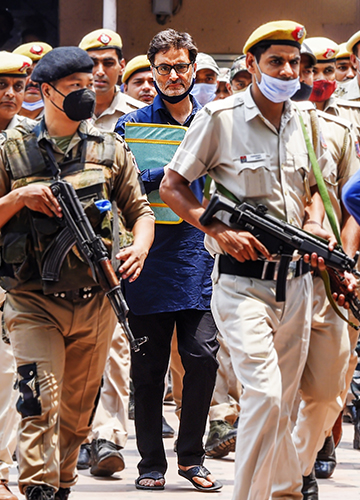On May 25, a National Investigation Agency court convicted Yasin Malik and sentenced him to two life terms. Malik is the leader of the Jammu and Kashmir Liberation Front (JKLF), which seeks independence for Jammu and Kashmir from India and Gilgit-Baltistan from Pakistan. Apart from the two life sentences that will run concurrently, Malik has to pay a fine of Rs10.65 lakh for funding terrorists and violating sections of the Unlawful Activities (Prevention) Act (UAPA) and the Indian Penal Code.
Malik’s conviction has been hailed by some observers as a victory against separatism in Kashmir. The reality, however, is more complex.
Malik, 56, grew up at Maisuma, a densely populated neighbourhood in Srinagar, and studied arts at Sri Pratap College, Kashmir’s oldest institute of higher education. A violent altercation in Srinagar between cab drivers and security forces in 1980 provoked him to take the political plunge. He joined the Tala Party, a separatist group of mostly young people that stoked public anger by staging protests, such as the one in Srinagar in 1984 against the hanging of JKLF founder Maqbool Bhat.
In 1986, the party renamed itself the Islamic Students’ League, and Malik became its general secretary. The league campaigned for the Muslim Mutahida Mahaz (Muslim United Front, or MUF), a separatist coalition that challenged the dominant National Conference in the 1987 assembly polls. But the elections were rigged, the NC retained power, and MUF leaders and supporters were arrested and tortured.
A year later, Malik was among the first few groups of men that crossed the Line of Control (LoC) into Pakistan for arms training. He returned as commander of the JKLF’s famed HAJY group—comprising Hamid Sheikh, Ashfaq Majeed Wani, Javed Ahmed Mir and Yasin Malik—that inspired hundreds of Kashmiris to take up arms.
Malik was arrested in 1990, while fleeing from security forces during a raid at a safe house at Narwa in Srinagar. He jumped from the top floor of the safe house and was injured. He was released on bail in 1994, after which he publicly vowed to adopt nonviolent means to realise his goal of settling the Kashmir issue. He was subsequently removed as chief commander of the JKLF by the group’s patron, Amanullah Khan. But Malik, with his widespread support in the JKLF, retaliated by expelling Khan and taking control of the organisation.
Sources say the ceasefire announced by the JKLF in 1994 was the result of negotiations between Malik and the Centre. The talks were brokered by civil society members who had met Malik in jail. The Centre wanted militancy to end, and the ceasefire by the JKLF was a starting point.
Malik was issued a passport in 2001 and allowed to travel to the US for medical treatment. In 2003, after the umbrella body of separatists, the All Parties Hurriyat Conference, split into two factions—moderates and hardliners—Malik went his own way. He was part of a group of separatist leaders who travelled on a bus to Pakistan-occupied Kashmir (PoK) in 2005 to promote a peace deal between India and Pakistan. The deal fell through after its proponent, Pervez Musharraf, was forced to resign as Pakistan president. In 2007, Malik launched a campaign called Safar-i-Azadi (journey of freedom) to garner support for the right of political self-determination for the people of Jammu and Kashmir.
In 2009, he married Mushaal Mullick, a Pakistani citizen and alumna of the London School of Economics. The couple has a daughter, Raziya Sultana, who lives with Mullick in Pakistan.
The NIA arrested Malik in February 2019, months before the Union government voided Article 370. He was charged under UAPA sections 16 (committing a terrorist act), 17 (raising funds for a terrorist act), 18 (conspiracy to commit a terrorist act) and 20 (being a member of a terrorist gang or organisation), and IPC sections 120B (criminal conspiracy) and 124A (sedition).
Malik told the trial court that he had not committed any terrorist act after renouncing violence in 1994. He said he would not beg the court for mercy, hinting that he had no faith in the trial. If he was involved in terrorism, he said, why was he allowed to travel abroad, and why did seven prime ministers interact with him?
Malik is the second JKLF leader, after Bhat, to be convicted on terrorism charges. His trial had attracted international attention. On May 17, UK Minister Tariq Ahmad told the House of Lords that the British government was monitoring Malik’s trial “very closely”. Pakistan recently wrote to the US regarding the trial, and Islamabad summoned India’s charge d’affaires and handed over a demarche conveying the Pakistan government’s “strong condemnation” of the framing of “fabricated charges” against Malik.
The Organisation of Islamic Conference, too, issued a statement. “The general secretariat of the OIC expresses its deep concern over the pronouncement of life sentences for one of the most prominent Kashmiri leaders, Yasin Malik, who has been leading a peaceful freedom struggle for many decades,” it said. India’s ministry of external affairs slammed the statement, saying it was “unacceptable”.
Malik’s sentencing prompted protests and shutdowns in parts of Srinagar. His sister recited verses from the Quran and women of Maisuma sang ballads in his praise. Observers say Malik is a moderate who has helped the government several times to calm the situation in Kashmir. After he eschewed violence, he was widely seen as a voice of reason.
The valley has now lost that voice.


